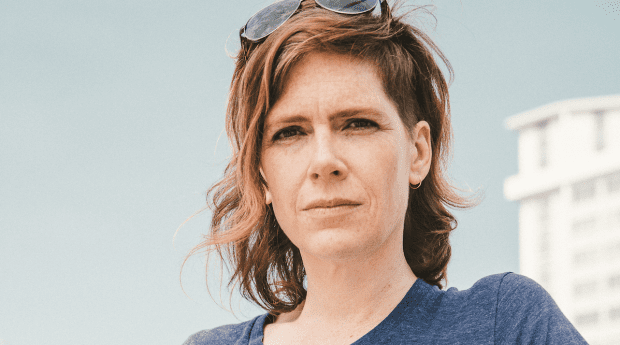After months of speculation, Buddies in Bad Times Theatre has finally announced that its new artistic director will be evalyn parry. The choice seems a natural fit: parry has been working with the company for over 10 years, first as director of the youth program and more recently as head of the Young Creator’s Unit (the hugely successful series that’s produced Agokwe, Obaaberima and Fishbowl, the latter two which parry directed). As part of the Independent Aunties, she’s developed the award-winning shows Clean Irene and Dirty Maxine and Breakfast, as well as directing countless cabaret events, Rhubarb shows and youth projects.
Daily Xtra caught parry backstage at Sudbury Pride, where she’s currently performing, to chat about the necessity of queer theatre, her plans for Buddies and what it means to be one of the only women running a major theatre company in the country.
Daily Xtra: How are you feeling now that the news has dropped? Is it amazing or is there a sense of “Holy Shit! What have I gotten myself into?”
evalyn parry: It’s a bit of both actually. (laughs) I’ve known for a few weeks so I’ve had to keep it on the down-low. Now that it’s out, it’s a bit of a crazy day. I’m pretty excited of course, but it’s going to be a big shift in terms of focus and energy, so it’s taken a while to adjust to the idea.
Stepping back from your new position, what for you is the function and importance of a queer theatre in Toronto in the year 2015?
Well, I can’t answer that question in terms of a non-specific queer theatre, but I can talk about it in terms of Buddies. For me, queer culture has a lot to do with challenging social and sexual norms. Particularly in the last year with gay marriage passing in the US, it would seem queer issues have become more mainstream and heteronormative. But we’re at a really exciting time now that marriage has been legislated because it’s going to free up energy to ask new questions. I can’t even guess what those might be right now, though I hope queer culture can take up issues of the environment, race, indigeneity and decolonization.
Theatre is an ancient art form and there are all these questions of its relevance in our new, ultra-connected digital age. But I believe live performance is very specific in its ability to have an immediate conversation. With those two things in mind, I think we have even more necessity for the kind of theatre Buddies is, which is a space to ask big questions of mainstream society and of queer culture.
In terms of your vision for the company, what would you like to see happen in the coming years?
I’m really interested in some of the less dominant voices within our culture: aboriginal voices, more lesbians and queer women, more trans voices. Buddies has already done a good job in the last little while of moving toward a wider scope of investigation in terms of queer identity and I want to take that further. I want to examine how we can push the envelope of interdisciplinary work and unconventional form. I also have a particular interest in queer elders. We’ve done a pretty awesome job developing our youth at Buddies and I’d like to see how we can do that with the elders in our community. History is always a great source of inspiration for me artistically and that history and lived experience is so interesting to examine at this specific cultural moment.
Your own practice has involved a lot of touring and direct community involvement, working with people in rural communities like in the Arctic. How do you see that practice meshing with your new role?
I didn’t know about this job until very recently, so next year is already pretty scheduled. I’m going to be away for a few chunks but the board hired me knowing that was the case, and they’ve been very clear in terms of encouraging me to take outside work and have other experiences that are away from the company. The next few years are going to be about ramping travel down a bit, but I actually welcome the idea of getting to be home more.
You’ll be the second woman to lead the company in its 36-year history, and one of the only women running a major company in Canada. What do you feel like that says?
I certainly hope the board hired me because they thought my vision was the best, but it’s also incredibly significant for Buddies to have hired a woman. Even if it wasn’t me who got the job, I’d really hoped they would hire a woman or a trans person this time. In terms of the larger symbolism, I’m not sure what it means, but I feel like it does mean something. It’s difficult to draw anything larger out because we have so few examples of women running these companies. But it’s exciting to see women moving into these roles and see what that means for the whole ecology.


 Why you can trust Xtra
Why you can trust Xtra


